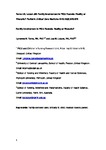Family Involvement in PICU Rounds
| dc.contributor.author | Tume, LN | |
| dc.contributor.author | Latour, JM | |
| dc.date.accessioned | 2016-08-19T11:14:10Z | |
| dc.date.available | 2016-08-19T11:14:10Z | |
| dc.date.issued | 2015-11 | |
| dc.identifier.issn | 1529-7535 | |
| dc.identifier.issn | 1947-3893 | |
| dc.identifier.uri | http://hdl.handle.net/10026.1/5345 | |
| dc.description.abstract |
In pediatrics, the family are the centre of the child’s life, and crucial to their psychosocial wellbeing and their recovery from illness. Despite the impetus to improve family centered care in pediatric and neonatal intensive care units, practices are not consistent worldwide. In most North American, Antipodean and Northern European PICUs family visitation is not restricted. However, in some countries restrictions still apply to family access, preventing the delivery of family centered care (1, 2). Even if families are present in the PICU, their involvement in medical rounds is often restricted or not encouraged. Yet, between 85 – 100% of family members in intensive care settings would choose to be present for rounds, if given the choice (1). More specifically, a recent study in PICU found family members believed that their presence during rounds would improve the care of their child; 100% of parents who were present during a round and 87% of parents who were absent during a round (3). | |
| dc.format.extent | 875-876 | |
| dc.format.medium | ||
| dc.language | en | |
| dc.language.iso | eng | |
| dc.publisher | Ovid Technologies (Wolters Kluwer Health) | |
| dc.subject | child | |
| dc.subject | critically ill | |
| dc.subject | family-centered care | |
| dc.subject | medical rounds | |
| dc.subject | parent | |
| dc.title | Family Involvement in PICU Rounds | |
| dc.type | journal-article | |
| dc.type | Editorial Material | |
| plymouth.author-url | https://www.ncbi.nlm.nih.gov/pubmed/26536547 | |
| plymouth.issue | 9 | |
| plymouth.volume | 16 | |
| plymouth.publication-status | Published | |
| plymouth.journal | Pediatric Critical Care Medicine | |
| dc.identifier.doi | 10.1097/pcc.0000000000000487 | |
| plymouth.organisational-group | /Plymouth | |
| plymouth.organisational-group | /Plymouth/Faculty of Health | |
| plymouth.organisational-group | /Plymouth/Faculty of Health/School of Nursing and Midwifery | |
| plymouth.organisational-group | /Plymouth/REF 2021 Researchers by UoA | |
| plymouth.organisational-group | /Plymouth/REF 2021 Researchers by UoA/UoA03 Allied Health Professions, Dentistry, Nursing and Pharmacy | |
| plymouth.organisational-group | /Plymouth/Research Groups | |
| plymouth.organisational-group | /Plymouth/Research Groups/Institute of Health and Community | |
| plymouth.organisational-group | /Plymouth/Research Groups/Plymouth Institute of Health and Care Research (PIHR) | |
| plymouth.organisational-group | /Plymouth/Users by role | |
| plymouth.organisational-group | /Plymouth/Users by role/Academics | |
| dc.publisher.place | United States | |
| dcterms.dateAccepted | 2015-01-01 | |
| dc.rights.embargodate | 2023-10-11 | |
| dc.identifier.eissn | 1947-3893 | |
| dc.rights.embargoperiod | Not known | |
| rioxxterms.versionofrecord | 10.1097/pcc.0000000000000487 | |
| rioxxterms.licenseref.uri | http://www.rioxx.net/licenses/all-rights-reserved | |
| rioxxterms.type | Journal Article/Review |


